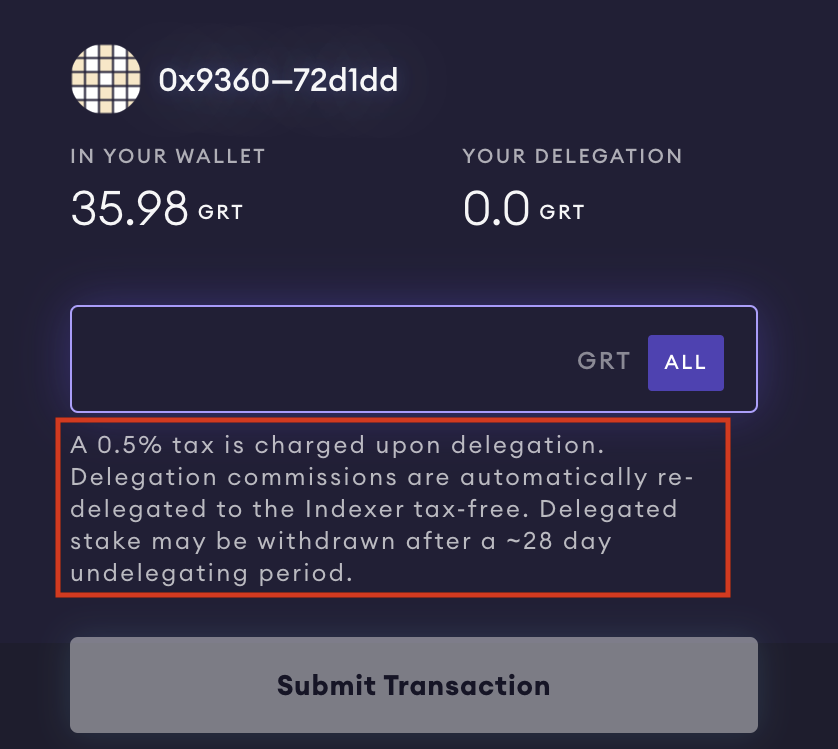8 分钟
委托
要立即开始委托,请查看The Graph上的委托。
概述
委托人通过将GRT委托给索引人来获得GRT,这有助于网络安全和功能。
委托的好处
- 通过支持索引人来增强网络的安全性和可扩展性。
- 赚取索引人生成的奖励的一部分。
委托是如何运作的?
委托人从他们选择委托GRT的索引人那里获得GRT奖励。
索引人处理查询和获得奖励的能力取决于三个关键因素:
- 索引人的自我质押(由索引人质押的GRT)。
- 委托人委托给他们的总GRT。
- 索引人为查询设置的价格。
GRT质押和委托给索引人的越多,它们可以服务的查询就越多,从而为委托人和索引人带来更高的潜在回报。
什么是委托能力?
委托能力是指基于索引人的自身质押,索引人可以从委托人接受的最大GRT量。
Graph网络的委托比率为16,这意味着索引人在委托的GRT中最多可以接受其自身质押的16倍。
例如,如果索引人的自身质押为1M GRT,则其委托容量为16M。
为什么委托能力很重要?
如果索引人超过其委托能力,则所有委托人的奖励都会被稀释,因为超出的委托GRT无法在协议中有效使用。
这使得委托人在选择索引人之前评估索引人的当前委托能力至关重要。
索引人可以通过增加自身质押来增加其委托能力,从而提高委托代币的限制。
The Graph上的委托
请注意,本指南不包括设置MetaMask等步骤。以太坊社区提供了一个关于钱包的全面资源。
本指南有两个部分:
- 在 The Graph 网络中委托代币的风险
- 如何计算作为委托人的预期回报
委托风险
下面列出了作为协议中的委托人的主要风险。
委托税
委托人不能因为不良行为而被取消,但对委托有税,以抑制可能损害网络完整性的不良决策。
作为委托人,了解以下内容很重要:
-
每次委托时,您将被收取0.5%的费用。这意味着,如果您委托1,000 GRT,您将自动消耗5 GRT。
-
为了安全起见,委托人应该通过委托给索引人来计算他们的回报。 例如,委托人可能会计算他们需要多少天才能收回其委托的 0.5% 税。
解除委托期
每当委托人想要解除委托时,他们的代币都有 28 天的解除委托期。
这意味着他们在 28 天内不能转移他们的代币,也不能获得任何奖励。
在解除委托期结束后,GRT将返回您的加密钱包。
为什么这很重要?
如果您选择了一个不值得信赖或者没有做好工作的索引人,您会想要解除委托,这意味着您将失去很多获得奖励的机会。
因此,建议您明智地选择索引人。

委托参数
为了了解如何选择值得信赖的索引人,您需要了解委托参数。
- 索引奖励削减-索引人将为自己保留的奖励部分。
- 这意味着,如果该项被设置为 100%,作为一个委托人,你将获得 0 个索引奖励。
- 如果设置为80%,作为委托人,您将获得20%。

-
查询费用削减-这就像索引奖励削减一样,但它适用于索引人收集的查询费用的回报。
-
强烈建议您探索The Graph Discord ,以确定哪些索引人具有最佳的社会和技术声誉。
-
许多索引人在 Discord 中非常活跃,他们将很乐意回答您的问题。
计算委托人的预期收益
在此处,计算您的委托的投资回报率。
委托人在确定收益时必须考虑很多因素:
索引人使用委托的GRT的能力会影响他们的奖励。
如果索引人没有分配所有可支配的GRT,他们可能会错过为自己和委托人实现潜在收益最大化的机会。
索引人可以在1到28天的窗口内随时关闭分配并收集奖励。然而,如果没有及时领取奖励,即使有一部分奖励无人领取,总奖励也可能会显得较低。
考虑到查询费用的分成和索引费用的分成
您应该选择一个在设置查询费和索引费减免方面透明的索引人。
计算公式是:

考虑索引人委托池
委托人应考虑他们在自己拥有的委托池中所占的比例。
所有的委托奖励都是平均分配的,根据委托人存入池子的数额来决定池子的再平衡。
这使委托人拥有了委托池的份额:

上面的公式表明,一个只向委托人提供20%的索引人可能比一个提供90%的索引人提供更好的奖励。只需进行数学运算,即可确定最佳奖励。
委托人常见问题和错误
MetaMask“待定交易”错误
有时,通过MetaMask委托给索引人的尝试可能会失败,并导致长时间的“未决”或“排队”交易尝试。
这个漏洞的一个简单解决方案是重新启动浏览器(例如,在地址栏中使用“abort:restart”),这将取消所有之前的尝试,而不会从钱包中扣除燃气费。一些遇到此问题的用户回报了在重新启动浏览器并尝试委托后交易成功。